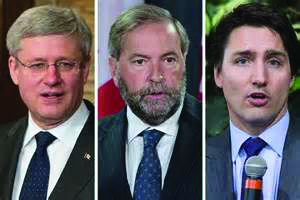Complaining about the length of an election campaign is a very Canadian thing to do. It’s like griping about how long winter lasts, i.e. pointless. You can moan all you want, but February still comes every year. Just like Mother Nature, prime ministers are resolutely indifferent to your beliefs about the length of time certain hardships must be endured. Spring will come when it comes, and writs will be dropped when they are dropped. Been that way forever, so stop worrying about it.
But wait, some will exclaim. Prime Minister Stephen Harper’s decision to start the campaign so far from the fixed election date of Oct. 19 is pure calculation! The Conservatives changed the rules to allow parties to spend more money in longer campaigns!! The super-long campaign will benefit the Conservatives, because they have raised way more money than the Liberals and the NDP, and can therefore outspend them!!!
All true, but before the nation exhausts its supply of exclamation marks, ask yourself this: If, after the ballots are counted, the Tories are returned to power, will NDP Leader Thomas Mulcair and Liberal Leader Justin Trudeau dare to blame their losses on the parsimony of their supporters and their parties’ inability to raise funds?
No. They won’t.
And there’s this: Given that polls show a dead heat between the NDP and the Tories, it is conceivable at this point to imagine an NDP victory. Will money have earned them the right to govern?
Again, no.
This campaign will not be about money. It will be about the leaders’ performances on the hustings and in debates. It will be about getting out the vote on election day. And it will be about the issues, of which there are many.
It’s arguable, in fact, that a long campaign could work against Mr. Harper with regard to some of the issues. The economy, for instance. The Canadian dollar has tanked and growth has stalled in the first half of the year. The oil sands – the centrepiece of Mr. Harper’s vision of this country as an energy superpower – have been hurt by the drop in crude prices. Throughout the election, monthly Statistics Canada reports on employment, unemployment and economic growth will be landing. The future data, unknown until it is released, may throw Mr. Harper a lifeline, or drag him down. It won’t be easy to face daily questions about a compromised economy for which he, as prime minister, is nominally responsible.
The Senate scandal is another potentially harmful issue. The trial of Mike Duffy, the Conservative senator appointed by Mr. Harper, on fraud and bribery charges resumes in less than two weeks, and Mr. Harper’s former chief of staff, Nigel Wright, is scheduled to testify. If the Prime Minister is campaigning, he will have to show his face to reporters every day of the Duffy trial – something he has assiduously avoided doing so far.
But the opposition leaders will be under the gun, too. Mr. Trudeau has been tagged as too inexperienced to be prime minister – or so claims the Tory war room. The thing about the Conservative Party’s negative attacks, however, is that they always contain a seed of potential truth – think of Michael Ignatieff and “He didn’t come back for you.”
This is Mr. Trudeau’s chance to show otherwise. If he does well during a long campaign, he will be impossible to discount. He could even get an unintended boost by defying the low expectations set by the Tories.
And then there is Mr. Mulcair. He is hungry to campaign full-time, given his sudden, surprising rise to the top of the polls. But he, too, will have to negotiate a daily barrage of flak from his opponents – the NDP has never been a front-runner before – while maintaining the demeanour of a senior leader that has won him new respect. He also has to convince Canadians that a party that has never governed at the national level is ready and able to do so.
We don’t mean to ignore Elizabeth May, the Leader of the Green Party. She may be a solid politician and leader, but she won’t be the next prime minister under our first-past-the-post system. That job will go to one of either Mr. Harper, Mr. Trudeau or Mr. Mulcair.
Between now and Oct. 19, the three main party leaders will be beset by scandals and gaffes and surprises. There will be attack ads and, possibly, dirty tricks. The leaders will have to get their ideas out through a lot of competing noise. And their fates could turn on a single moment during a debate.
But by the end of a long and gruelling federal campaign that is twice as long as most in the recent past, the winner will have proven himself ready to lead.
So here is one final tip: Be a part of it. Make sure to vote. Turnout in federal elections is inexcusably low in Canada: Almost four out of 10 people don’t bother. While the leaders are doing their jobs, make sure to do yours. You can’t control the weather, but you can choose your government.
Editorial:The Globe and Mail




